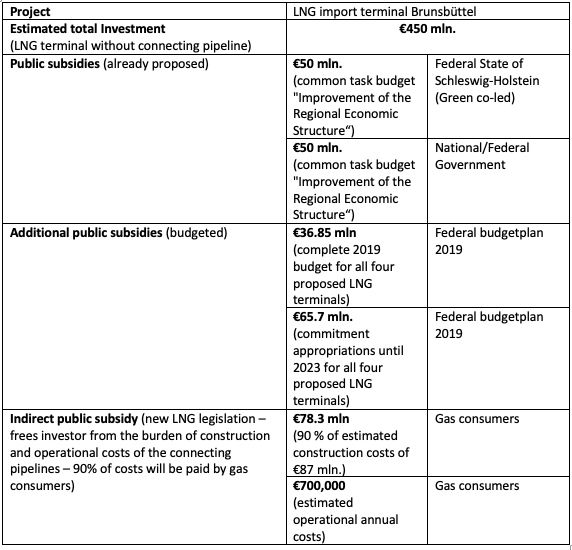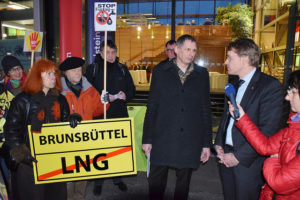World Upside Down: Voters Trust German Greens to Handle Climate Crisis Just as Party Throws Support for American Fracked „Freedom“ Gas
A long, long time ago, in a country known for its green forests, old traditions and also large-scale industry, a miracle was about to happen. A real and much-needed clean energy transition by an industrialized – and very influential – European country was on the way to the so-called "Energiewende." However, the transition was simply too successful. The mighty fossil fuel lobby saw that a move away from their dirty business model to a decentralized climate-friendly energy system based on renewables and energy efficiency (perhaps coupled with a changed economic model) was about to transform the old power patterns.
A long, long time ago, in a country known for its green forests, old traditions and also large-scale industry, a miracle was about to happen. A real and much-needed clean energy transition by an industrialized – and very influential – European country was on the way to the so-called “Energiewende.”
However, the transition was simply too successful. The mighty fossil fuel lobby saw that a move away from their dirty business model to a decentralized climate-friendly energy system based on renewables and energy efficiency (perhaps coupled with a changed economic model) was about to transform the old power patterns.
That’s why they’re fiercely fighting everything that might just save us from climate chaos. They’ve even infiltrated the minds of environmental groups, think tanks and most of the existing political universe. Their key to maintaining the polluting status quo is gas.
Germany is already Europe’s biggest gas consumer and dealer. Using almost 92 billion cubic metres (bcm) of fossil gas in 2017, gas accounted for 24 percent in Germany’s primary energy consumption. After its finally-announced coal phase-out, the fossil fuel industry sees an even bigger gas market emerging in Germany. Speaking at this year’s World Economic Forum in Davos, Chancellor Merkel re-assured the dirty fossil fuel industry that the coal phase-out means nothing but more gas in Germany.
Proposed LNG Terminals for Germany
With the existing Nord Stream pipeline, Gazprom is able to bring Russian gas directly to Germany through the Baltic Sea, allowing Moscow to bypass European transit countries such as Poland, Belarus, and crisis-hit Ukraine. Germany and Gazprom are now heavily pushing for the construction of a second pipeline, Nord Stream II, which would double the current Russian gas influx capacity, from 55 to 110 bcm per year.
But instead of stopping the project or starting a debate about the real need for gas in Germany, the country is additionally investing public money in similar projects to Nord Stream 2, such as the Southern Gas Corridor.
Meanwhile, under pressure from Trump’s administration, Merkel wants to co-finance the construction of at least one liquefied natural gas (LNG) terminal with public money. Four terminals are currently being discussed. The German federal budget for 2019 provides gas subsidies of €36.85 mln. plus €65.7 mln. of commitment appropriations until 2023. But that’s not the end of the story.
Under the common task budget, “Improvement of the Regional Economic Structure” private investments and infrastructure projects can also be subsidized. Fifty percent of the overall subsidy amount will be paid by the affected federal state and the other fifty percent will be paid by the national government. In the case of the proposed LNG terminal at Brunsbüttel, the current federal state government wants to dump €50 mln. of public money out of this common task budget into the otherwise unprofitable €450 mln. project. This would automatically trigger additional €50 mln. from the national government (for an overview of all possible subsidies, see the table down below).
Economy Minister Peter Altmaier called the support a “gesture to our American friends” – in full awareness of the fact that market analysts called the decision “the creation of an investment-ruin,” clearly outlining that “Germany doesn’t need Trump’s gas.”
The most far advanced candidate is the above-mentioned LNG terminal at Brunsbüttel, in the federal state of Schleswig-Holstein. According to Brunsbuettel Ports, the gas could come from the US and will be used on-site by petrochemical companies, for example, by Yara, one of the so-called ‘Exxons of agriculture,‘ to make fertilizer. German energy company RWE has signed a capacity contract with investor German LNG and reached in November 2018 a cooperation agreement with world leading LNG buyer Tokyo Gas. A month later, Woodside Energy Trading and RWE inked a mid-term LNG supply deal, with the primary source being fossil gas from the Corpus Christi LNG Project in Texas. Simply put, the German utility wants to buy more US LNG as Trump promotes gas riches in Europe.
The biggest competitor of Brunsbüttel is Stade, located in the neighbouring federal state of Lower Saxony. This location is favoured by petrochemical giant and fracking proppants provider Dow Chemical, which wants to use the gas for its energy-intensive facilities and as a direct feedstock for the production of plastics and petrochemicals. The Dow Chemical site alone consumes one percent of Germany’s electricity production.
Bowing down to pressure from the Trump administration, Germany’s Economy Minister, Peter Altmaier, has invited the biggest US LNG lobby groups to a conference in Berlin on February 12th.
In the presence of US Deputy Energy Secretary Dan Brouillette, Altmaier announced on the same day that the German Government will also change the existing legal framework so that consumers, not Investors, will have to pay for the construction and annual operational costs of the connecting pipelines for the LNG terminals.
The draft for the new legislation was secretly published on Thursday, March 14, 2019. The deadline for the submission of official statements was set for Tuesday, March 19, 2019, 3 pm CET. I was nonetheless capable of providing a statement on behalf of Food & Water Europe and the German Climate Alliance against LNG. Our document was signed by 25 environmental groups, highlighting the climate, environmental and economical threats related to the proposed LNG terminals, but also the obvious procedural flaws related to the proposed new legislation.
The German Federal Council had to approve the new legislation. Our hope was that the Green co-led federal state governments would at least abstain from the vote – which would have resulted in the rejection of the new legislation. However, the reality was different.
Greens in Power Selling Out Core Values
Instead of opposing (or even criticizing) the recent developments aimed at building up an unneeded LNG import infrastructure, the Greens voted in favour of the new legislation, paving the way for an influx of climate-hostile US fracked gas.
It’s pretty bad that the German Government (consisting of conservatives & socialists) is backing these plans, but it’s even worse when the Green Party (who forms part of the regional government in several federal states of Germany) supports the buildout of a fracked gas LNG import infrastructure backed by government subsidies.
I know, it sounds absurd – in particular given the fact that German Greens came in second during the April 2019 elections of the EU Parliament and that they’ve even hit a record high in a new opinion poll, pulling ahead of Angela Merkel’s conservatives.
Opposition on The Rise
The German people have definitely had enough of this ongoing hypocrisy and opposition is growing throughout the country.
Food & Water Europe initiated and co-founded the Climate Alliance against LNG in October 2018 that has forced the investor at Brunsbüttel to open up a public dialogue with several public events that took place in February 2019.
In the early hours of January 31, we surprised politicians and industry officials (who met for a so-called parliamentary breakfast to celebrate themselves) with a protest action in the front of the permanent representation of the federal state of Schleswig-Holstein in Berlin. We also handed out a petition against the proposed LNG terminals in Germany – signed by over 79,600 people.
In the meanwhile, our growing opposition draws the attention of the heavyweight German NGO Deutsche Umwelthilfe (German Environmental Aid), which has published a legal opinion that challenges the realization of the proposed LNG terminal at Brunsbüttel. Together with Friday for Future and Extinction Rebellion Germany protests were organized in the run-up of the mentioned LNG legislation vote in Berlin.
One thing is now clear for everyone involved: We are ready for this evolving fight. The struggle has just begun.
Table (possible public subsidies for LNG terminal Brunsbüttel)




 by
by